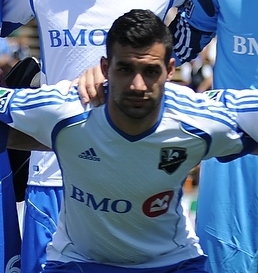Related Research Articles

Carlos Saúl Menem was an Argentine lawyer and politician who served as the president of Argentina from 1989 to 1999. Ideologically, he identified as a Peronist and supported economically liberal policies. He led Argentina as president during the 1990s and implemented a free market liberalization. He served as President of the Justicialist Party for thirteen years, and his political approach became known as Menemism.

Raúl Ricardo Alfonsín was an Argentine lawyer and statesman who served as President of Argentina from 10 December 1983 to 8 July 1989. He was the first democratically elected president after the 7-years National Reorganization Process. Ideologically, he identified as a radical and a social democrat, serving as the leader of the Radical Civic Union from 1983 to 1991, 1993 to 1995, 1999 to 2001, with his political approach being known as "Alfonsinism".

Eduardo Alejandro Romero was an Argentine professional golfer. Nicknamed "El Gato", he won over 80 professional tournaments around the world, including eight on the European Tour and five on the Champions Tour, with two senior majors; he also won over 50 times in South America and was a member of the Argentine team at the World Cup on 14 occasions.

Andrés Fabián Romero is an Argentine professional golfer who plays on both the PGA Tour and European Tour.

Club Atlético All Boys is an Argentine sports club based in Floresta, Buenos Aires. The institution is mostly known by its football team, which currently plays in the Primera B Nacional, the second division of the Argentine football league system.

Sergio Germán "Chiquito" Romero is an Argentine professional footballer who plays as a goalkeeper for Boca Juniors.

Andrés Fabricio Romero is a retired Argentine football striker.
Blas Agustin Romero is a retired football (soccer) forward from Paraguay.

The 2014 FIFA World Cup final was the final match of the 2014 World Cup, the 20th edition of FIFA's competition for national football teams. The match was played at the Maracanã Stadium in Rio de Janeiro, Brazil, on 13 July 2014, and was contested by Germany and Argentina. The event comprised hosts Brazil and 31 other teams who emerged from the qualification phase, organised by the six FIFA confederations. The 32 teams competed in a group stage, from which 16 teams qualified for the knockout stage. En route to the final, Germany finished first in Group G, with two wins and a draw, after which they defeated Algeria in the round of 16, France in the quarter-final and Brazil, by a score of 7–1, in the semi-final. Argentina finished first in Group F with three wins, before defeating Switzerland in the round of 16, Belgium in the quarter-final and the Netherlands in a penalty shoot-out in the semi-final. The final was witnessed by 74,738 spectators in the stadium, as well as over a billion watching on television, with the referee for the match being Nicola Rizzoli from Italy.
Lucas Daniel Romero is an Argentine professional footballer who plays as a defensive midfielder for Campeonato Brasileiro Série A club Cruzeiro.

Óscar David Romero Villamayor is a Paraguayan professional footballer who plays as an attacking midfielder for Campeonato Brasileiro Série A club Botafogo and the Paraguay national team. He is the twin brother of Ángel Romero.

Ángel Rodrigo Romero Villamayor is a Paraguayan professional footballer who plays as a winger for Corinthians and the Paraguay national team. He is the twin brother of Óscar Romero.

Maximiliano Samuel Romero is an Argentine professional footballer who plays as a centre forward for Argentinos Juniors, on loan from Racing Club.

Cristian Gabriel "Cuti" Romero is an Argentine professional footballer who plays as a centre-back for Premier League club Tottenham Hotspur and the Argentina national team. Renowned for his aggressive defensive approach, tackling ability, aerial dominance, and ball-playing ability, Romero is considered one of the best defenders in the world.
Braian Ezequiel Romero is an Argentine professional footballer who plays as a centre-forward for Argentine Primera División club Club Atlético Vélez Sarsfield.

Alejandro Sebastián Romero Gamarra, nicknamed Kaku, is a professional footballer who plays as an attacking midfielder or winger for Emirati club Al Ain and the Paraguay national team.
Matías Alexis Romero is an Argentine professional footballer who plays as a midfielder or right winger for Instituto.
Antisemitism is the practice of showing hostility toward or discrimination against Jews as a religious, ethnic, or racial group. In Argentina antisemitism has been around since Spanish colonization in the sixteenth century, and has continued to the present day. In the twentieth century antisemitism in Argentina was particularly pervasive, especially in the World War II and post-World War II eras. In these eras Argentine antisemitism adopted Nazi antisemitism, and blended it with religious (Catholic) hostility, which allowed vehement antisemitism in Argentina to persist well into the 1970s and 1980s.
Zaid Abner Romero is an Argentine professional footballer who plays as a centre-back for Belgian side Club Brugge.

Luka Romero Bezzana is a professional footballer who plays as an attacking midfielder and winger for La Liga club Alavés, on loan from Serie A club AC Milan. Born in Mexico, he represented Argentina at the youth international level.
References
- ↑ Romero, p. 289